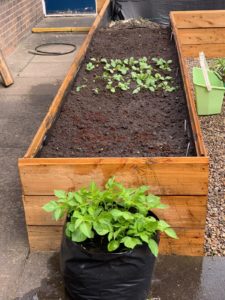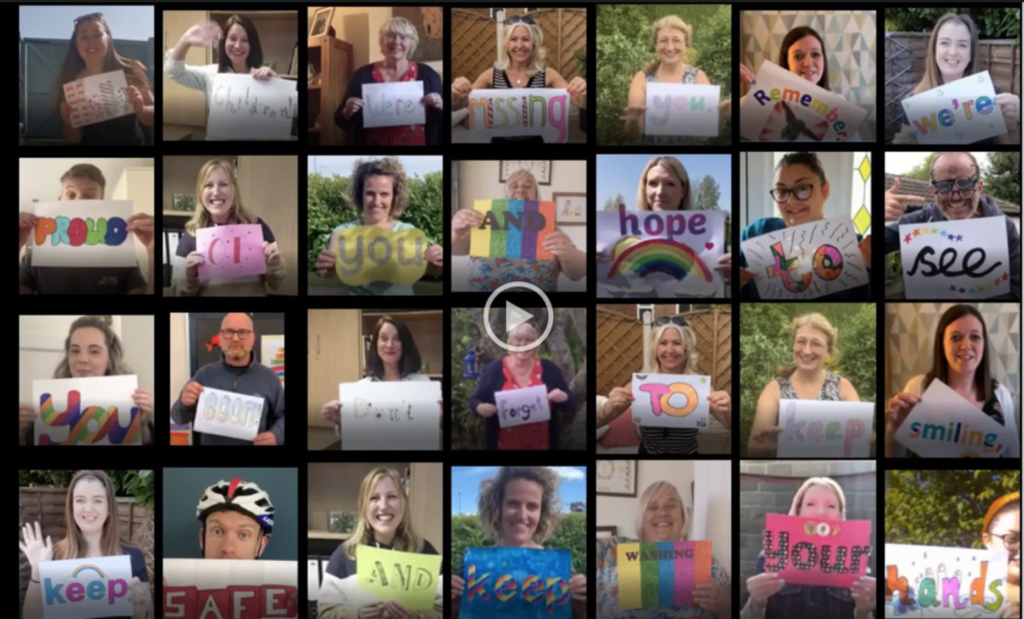Home learning and other support (07 May 2020)
Posted on 07 May 2020 by Mr Roundtree
Tomorrow is a bank holiday to commemorate VE Day. We’ll continue with home learning tasks, but remember that on such a day, we completely understand if you want to step back and enjoy – as much as you can – the bank holiday. (The same goes for next Friday, too – this was scheduled to be a training day at school.)
We’ve had a few parents tell us their child has reached the end of the exercise books we sent home just before schools closed. If this is the case, you can call in to school on Monday morning when Miss Beatson will be there.
Fancy getting creative?
Monday’s message was about additions or alternatives to the home learning tasks your teacher sets your child. We know some tasks might end up being a bit tricky for some people, so it’s a good idea to have different things for them to get stuck into…
Your child could create a National Book Token design and win a £10 National Book Token for themselves and each of their classmates. The National Book Token people will select one child’s design to put on a gift card every week for seven weeks. When schools open up again, the young designer and their classmates will each receive a £10 National Book Token displaying the winning artwork.
Talking of which, there are plenty of competitions during the lockdown period. The list comes from Child Friendly Leeds, which has lots of guidance, activities and creative ideas for families, too.
ArtForms in Leeds has different weekly home learning ideas for you and your child to check out. In the current week (Week 7), we love the idea for older children to create their own city using nets.
…And finally, don’t forget your child could get creative alongside you in the kitchen or in the garden if you have one.
Home learning and other support (06 May 2020)
Posted on 06 May 2020 by Mr Roundtree
We’re keeping today’s message a happy and healthy one…
All the teachers are missing their children each day (and seeing you, the parents and carers, too). They’re busy working away on your home learning tasks, and enjoying all the emails coming in, but teachers from each school have found time over the last couple of weeks to create three very different videos, all of which were intended to put a happy and healthy smile on your faces!
By now, you’ve probably seen your child’s own school teachers, but we thought it might be nice to bring the three together for today’s message.
The Head of School at Moortown, Mrs Weekes, got her creative juices flowing and wrote a reflective poem. The teachers in the clip start off with the Reception teacher (sporting a fetching lockdown haircut) and working up to the Year 6 teacher and then Miss Rushbrooke and finally Mrs Weekes herself.
https://youtu.be/ffftYO7hIKg
Almost all the St James’ CE Primary staff feature in this one – and even pupils at Moortown and Scholes might recognise one or two familiar faces (although I’m sure nobody knows who that strange person wearing five pairs of glasses is). Can you spot another lockdown haircut?
https://www.youtube.com/watch?v=wkRfN8tEuuA&feature=youtu.be
Miss Hague kicks off this video in a very nonchalant mood. She, and plenty of others, get to show off some secret talents in the Scholes (Elmet) video. Now, maybe I’m too cynical, but there’s one clip on here that looks just too good to be true…
https://www.youtube.com/watch?v=4Svz0O97Z_Q&feature=youtu.be
We hope you like them.
What's growing?
Posted on 06 May 2020 by Miss Beatson
Mr Atkins has been very busy planting some vegetables in our school allotment. Can you guess what he has planted?
There are peas, carrots, radishes, lettuces, beetroot, spring onions and potatoes! Thank you Mr Atkins for watering them and keeping them going until we are all back at school.


Home learning and other support (05 May 2020)
Posted on 05 May 2020 by Mr Roundtree
Yesterday’s message was mainly about additions and alternatives to the home learning tasks. Today, we’re suggesting four different ways to support you…
First… Public Health England has updated their guidance for households with possible coronavirus (COVID-19) infection. The guidance is for households with grandparents, parents and children living together where someone is at risk or has symptoms of coronavirus (COVID-19) infection.
Second… Here is the digital link for our first Families Leeds & West Yorkshire ‘lockdown’ issue.
The issue gathers together, in one place, fantastic resources and advice to help parents manage the next few weeks. (And there are also £100 Amazon vouchers to be won!)
Third… You can access online support for parents and carers during the current situation – use the code ‘north‘ when prompted. This is a service from Northpoint and Silvercloud Health.
The service has been designed by clinical experts with the aim of empowering you to think and feel better. The website includes programmes that are tailored to your needs. It contains easy to use content and interactive tools. The online space is secure and anonymous. No identifying details are required apart from a contact e-mail address.
And finally, fourth… We’re just a little into May, so this one’s not too late… Well-being charity Action for Happiness has published its Meaningful May calendar which has ideas and top tips to help us respond to the global crisis with a sense of purpose and meaning. To help have a great meeting, the charity has published new guidance for people hosting online groups, with some really good ideas.
Home learning and other support (04 May 2020)
Posted on 04 May 2020 by Mr Roundtree
It seems that the general mood in lockdown is one of ups and downs – we really hope there haven’t been too many downs for you and your family.
Today’s message is about additions or alternatives to the home learning tasks your teacher sets your child. We know some tasks might end up being a bit tricky for some people, so we’ve three alternatives here.
Living and learning during lockdown
Living and Learning is the name for all the teaching and learning we do around Personal, Social, Health and Economic Education (PSHE). Each week in school, we have a Living and Learning statement. This week’s is I can describe and use ways to calm down. One of the Sphere Federation Health Leaders writes:
Listen to the new story Everybody worries by Jon Burgerman. The story focuses on the emotion of being anxious. Getting stressed, anxious or angry are important and useful emotions but sometimes these feelings can be overwhelming.
Different people use different ways to calm down. Talk at home about the ways people around you calm down. Your child might be aware of different relaxation or mindfulness techniques we’ve talked about at school.
Here are some techniques for your child (and you) to try. Let us know which are favourite techniques!
- Go to a ‘quiet spot’. Turn calming down into a positive by designating a place where we can go to calm down.
- Go outside for a walk or run
- Take some deep breaths. Slowing down our breathing can help our body calm down.
- Count to 10 (or 100). Try this in your head (not out loud).
- Listen to some soothing music.
- Think of something you’re grateful for.
- Look at a funny picture or video.
- Use guided meditations.
- Loosen up – Do some stretches or yoga.
- Sit quietly and have a drink
Writing
Another additional or alternative home learning task is for your child to get stuck into some writing. Many of you have told us that writing has been the trickiest home learning task, so teachers have reduced the number of writing tasks we’re setting. However, quite a few children are missing getting their creative juices flowing. Download this set of writing ideas – they might spark off an idea! Your child’s class teacher will still be happy to read the writing, and your child might like to share the piece with friends and family, too, of course.
Geography
One parent I spoke with last week substituted a geography home learning task with an alternative for her child: to do a jigsaw of a map of Europe with her child – good idea!
You can help your child at home by looking at online maps (like Google Maps) and finding different places (look at the lists below to judge what type of places), and then doing a quiz full of facts about them. Your child could match capitals and countries, for example. Make it harder by missing out the vowels in the words (so they have to consider the spellings a little, too: dnbrgh – Sctlnd).
Geography age-related expectations can be found in our Curriculum Statement in the Curriculum and expectations page of our website. Home-friendly ones to work on are the facts about locations:
By the end of Year 2, geography expectations include:
- I know the four countries and capital cities of the UK.
- I know the seas which surround the UK.
- I know the world’s seven continents.
- I know the world’s five oceans.
By the end of Year 4, the expectations include:
- I know the main cities of the UK (the four capitals and at least four more).
- I know some of the counties in the UK.
- I know some of the main rivers and mountains in the UK (at least three of each).
- I know some European countries and their capital cities (at least four, not including those in the UK).
- I know some of the main rivers and mountains in Europe.
- I know the position of the Equator, Northern Hemisphere, Southern Hemisphere, the Tropics of Cancer and Capricorn, Arctic and Antarctic Circle.
And by the end of Year 6, they include all of the above, plus:
- I know some of the main rivers, mountains and regions (eg the Yorkshire Dales, the Lake District, the Highlands of Scotland) in the UK (at least three of each).
- I know some European countries and their capital cities (at least six, not including those in the UK).
- I know some world-wide countries and some of their major cities.
Have you watched our video yet?
Posted on 04 May 2020 by Mr Roundtree
Have you watched our video yet?
To help cheer us up, and hopefully cheer you up, too, we made a short video for you to watch – make sure you all follow the advice in our message!
Parent / carer survey
Posted on 01 May 2020 by Mrs Quirk
At St James’, we’re always keen to hear your views. We hope that you let us know of any questions, comments and concerns (as well as causes for celebration!) whenever these crop up, but we like to gather your views in our annual survey, too.
We know that in the current situation, it might feel a bit strange to be asking you questions about learning when it’s you who’s currently teaching your child. You might also feel you’ve no time to respond. Because of this, we’ve tried to keep the survey short and simple this year:
- we’ve used only some of the questions that Ofsted asks
- all you need to do is click on the relevant response for each question
- there’s just one space for comments at the very end, only if you’d like to add anything or explain one of your answers
The survey should only take about five minutes, and you’ve plenty of time – the deadline is Friday 29 May 2020.
Although we can’t guarantee to meet the needs and wants of every parent / carer, we do assure you that if specific areas for improvement are highlighted by the responses from this survey, we aim to act on these.
We’re looking forward to receiving your responses.
Home learning and other support (01 May 2020)
Posted on 01 May 2020 by Mr Roundtree
And we’ve all made it to May!
Monday’s message noted that we were only beginning the fourth week of home learning, so now that’s another week all done and dusted: by the end of today, you and your child will have completed 20 days of home learning – well done.
Talking of dates, it’s useful for those parents who are key workers to know that Moortown Primary and Scholes (Elmet) Primary are still open on the forthcoming bank holiday on Friday 08 May. (For the key worker parents at St James’, your child can attend either Moortown or Scholes, as arranged already.)
There’s a lot of speculation about when and how schools will re-open. We think it’s best just to step away from some of those headlines until we get some clear facts.
In the meantime, how’re you doing? I’m sure better than this Ofsted report!
Have you got a routine going with the home learning tasks? Even if you have, it might need a boost to help you keep on going. The Education Endowment Foundation (EEF) has produced a really simple, one page tick sheet for your child to use – we really like it!
You can find lots more from the EEF that will support you at home.
A happy and healthy message from all the staff at St James'
Posted on 30 April 2020 by Mr Roundtree
We’re missing you!
To help cheer us up, and hopefully cheer you up, too, we’ve made this little video for you to watch – make sure you all follow the advice in our message!
 Here’s a short quiz for your child (and you?!) to have a go at, too:
Here’s a short quiz for your child (and you?!) to have a go at, too:
- Which teacher starts off the video with the word ‘Hello’?
- Why do you think Mr Mills might be feeling proud in his first clip?
- How many glasses is Mr Roundtree wearing?
- Towards the end of the clip, who’s bouncing around?
- What safety message is Mr Mills demonstrating in his second clip?
- How many rainbows appear in the video clips?
- Who has a little helper to show their word?
- Where is Mr Atkins standing for his video?
- Why do you think the music track was chosen for this video?
- How do you think the teachers are feeling?
And one more thing: make sure your child understands the message – they could write out each word as hey see it and then read it through to make sure it makes sense, for example.
Home learning and other support (30 April 2020)
Posted on 30 April 2020 by Mr Roundtree
Today’s message features a few recommendations around safeguarding…
Own It
We mentioned this yesterday, but it’s worth another mention today.
We reckon any child with a mobile phone of other device should be regularly using the BBC’s Own It app or website. It’s a really good start to helping your child lead a happy and healthy life online.
Thinkuknow: Summary of support and home learning ideas
With so much guidance and resources to support you in safeguarding children online and offline during COVID-19, it can be overwhelming to know where to start. To help make life a little bit easier, Thinkuknow have signposted key guidance and organisations.
They’ve also created some home activity packs that you and your child could use – this could be in addition to the teacher’s three home learning activities, or instead of one of them.
Video chat during isolation: new for parents and carers
Many of you have mentioned to us that your child (mainly those in Y5 and Y6) is using video-chats as a way to work with classmates during the home learning:
- maybe to share ideas at the start
- to take a break and motivate themselves mid-way through the home learning
- once done, to review their work (like checking answers, for example)
Of course, video-chats right now are a good way to stay in touch with friends and family, too (lots of teachers meet up online on Wednesdays for an online quiz!).
Two new Parent Info articles look at some of the things parents and carers should think about to make sure their child’s experience of video chat is safe and fun:
- Video chatting: a guide for parents and carers of primary school-age children
- Video chatting: a guide for parents and carers of secondary school-age children
NSPCC resources
The NSPCC has created some resources to support you during this difficult time. Topics include:
- talking to a child worried about coronavirus
- parents working from home
- children staying home alone
- lockdown and separated parents
- how to cope with tantrums and other difficult behaviour
What children are saying to Childline about coronavirus
You might be interested to read more about what children have shared with Childline during this pandemic.It might help you to consider what support your child might need at this time.
And finally today…
In our recent messages, we’ve included a lot of writing from our older children across Sphere Federation. Here’s just one of lots of examples of extreme reading that happened over Easter… This clip is of a younger pupil at Moortown doing some impressive reading and hula-hooping!